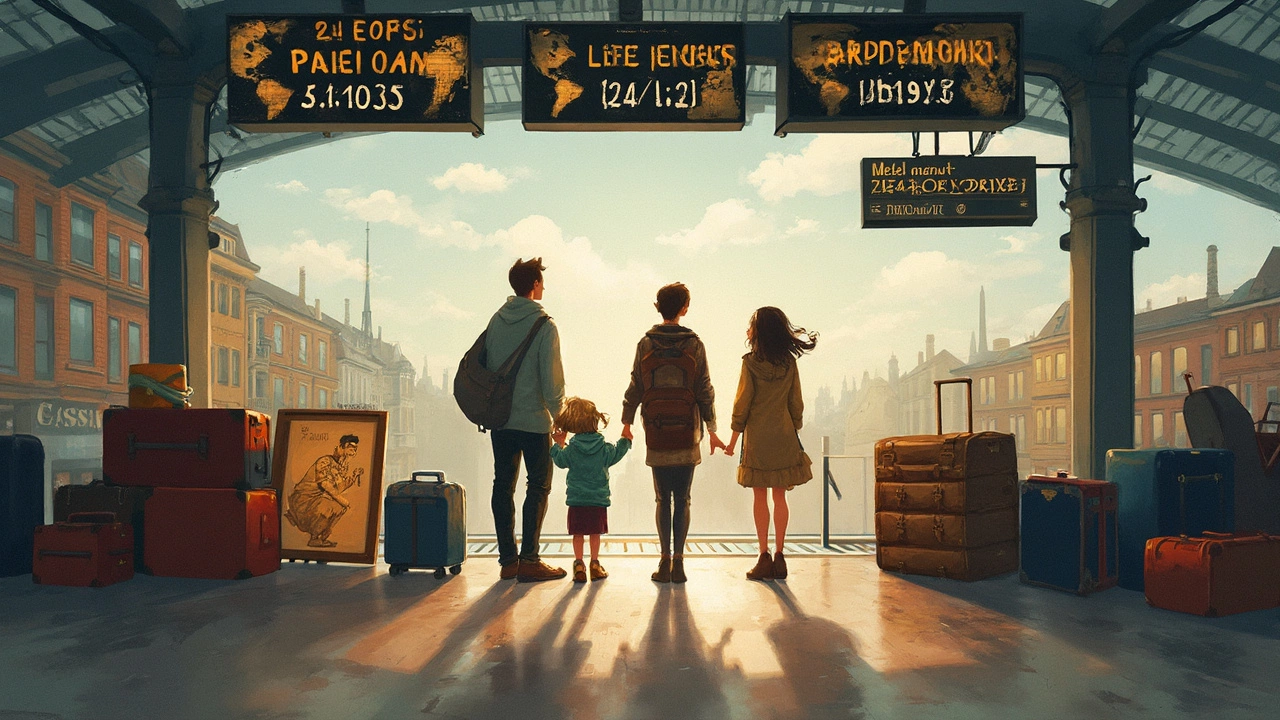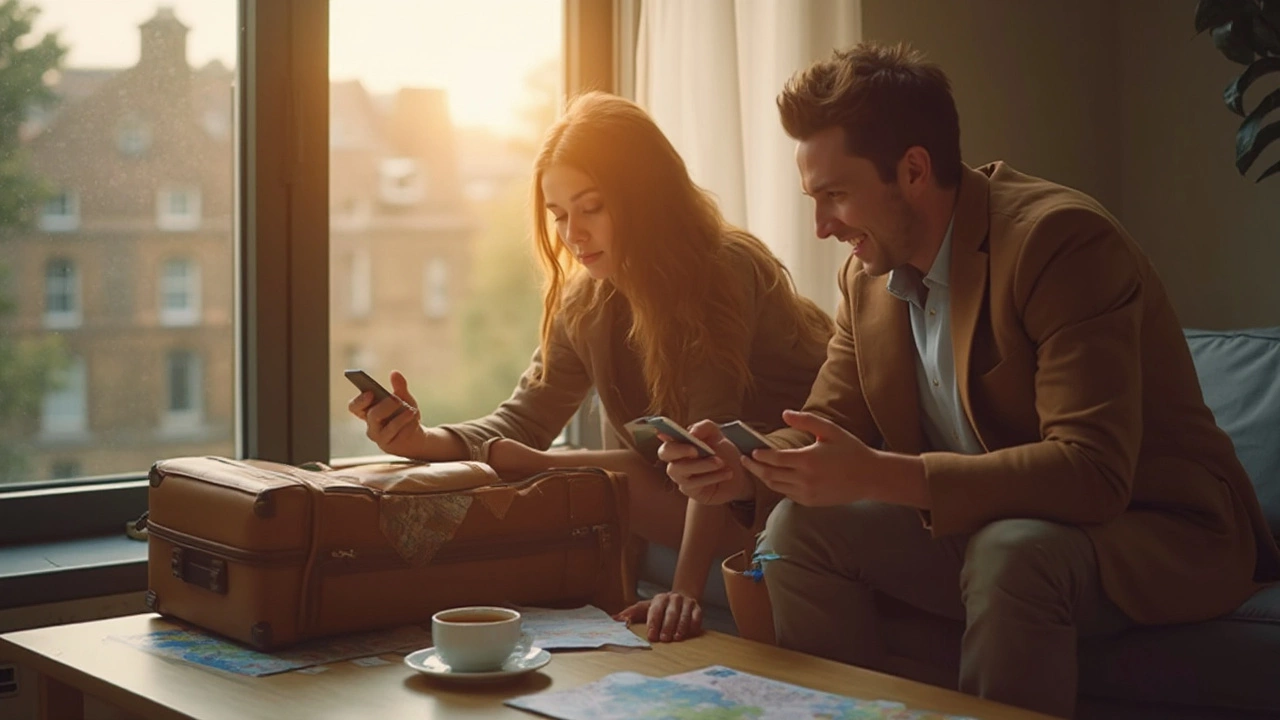Finding a last-minute romantic trip used to be simple. Check a few deal sites, maybe call up a travel agent, and snag an affordable package for two. Now, everything moves so fast that you blink and prices jump by a hundred bucks. Good luck trying to get that dreamy sunset cruise for the price you saw yesterday.
Ever tried booking a beach escape on a whim, only to discover the 'last minute' price is actually higher than booking in advance? You’re not alone. Data out of the big booking engines shows that last-minute deals are getting rarer, and the hidden bargains are just, well, hidden. It's not about beating the clock anymore—there are new rules, new tech, and more competition than ever.
- Where Did the Classic Love Holiday Go?
- Why Last Minute Isn’t Cheap Anymore
- Romance in the Age of Apps and Automation
- Smart Strategies for Scoring Deals
- What the Future Holds for Spontaneous Escapes
Where Did the Classic Love Holiday Go?
Scroll back ten years, and the idea of a spontaneous love holiday was everywhere in ads and travel sites. Couples would grab last minute deals for sun, city breaks, or a cozy retreat, and the whole thing felt easy. You picked a spot, packed a bag, and just took off. Now, that whole scene looks pretty different.
First big change? The rise of online booking and mobile apps. Everyone has instant access to all the same deals at the same time. That means those sweet, secret getaways for two got a lot more crowded—and occasionally pricier. The element of surprise is sort of lost when every good deal is zapped by an algorithm and sold out in minutes.
Another big shift: travel companies are tracking booking trends better than ever, with smart tech setting prices based on demand. So the closer you get to the travel date, the more likely it’ll cost more—not less. According to a 2024 report by Expedia, last minute hotel bookings were up 18% in price compared to those booked a month out.
| Year | Average Last Minute Price Markup (%) |
|---|---|
| 2015 | 4 |
| 2020 | 12 |
| 2024 | 18 |
That old-school charm of winging it on a Friday night for a surprise getaway is now fighting against digital systems built to squeeze the most out of your wallet. On top of that, social media plays a big role. There’s pressure to have the ‘perfect’ trip, with dreamy photos and viral-worthy experiences, which bumps up demand and prices for the destinations everyone wants.
Throw in the fact that people’s work schedules are tighter and flights fill up quicker, and the classic love holiday you imagine from rom-coms feels way less spontaneous and a lot more complicated. No wonder couples are starting to plan well in advance, even when the idea is to escape on a whim.
Why Last Minute Isn’t Cheap Anymore
A few years ago, people always talked about snagging a bargain by booking a last minute holiday. That’s changed, and here’s why. Most airlines and hotels have totally revamped their pricing models. They now use dynamic pricing, which means they bump up costs as the date gets closer and rooms or seats fill up. Instead of unloading spare rooms last minute at a discount, they know someone else (often a business traveler or desperate vacationer) will pay a premium.
The Covid era reshaped how companies handle cancellations and refunds. Properties tighten up on flexibility, and some airlines even limit last-minute deals, preferring to keep prices high so they don’t cannibalize regular bookings. Plus, with travel demand surging again, there just aren’t as many empty seats or unsold rooms to push out as super-low offers.
It’s not just gut feeling—you can see it in the numbers:
| Booking Window | Average Price Increase |
|---|---|
| More than 1 month out | Base price |
| 2 weeks out | +15% |
| 24-72 hours out | +24% |
The bottom line? Scoring a cheap love holiday at the last second is more the exception than the rule these days. The travel industry is using smarter tech, watching how people book, and squeezing extra revenue wherever they can. If you want a real deal, planning ahead is usually better—even if it kills the thrill of being spontaneous.

Romance in the Age of Apps and Automation
Love holidays aren’t about handwritten notes or mysterious postcards anymore—they’re booked through apps, usually at the last possible moment. Swipe, scroll, tap, and boom: your ‘perfect’ getaway is built by an algorithm. Big names like Booking.com and Expedia have invested millions in AI to recommend trips based on your past bookings and even the stuff you search for in the middle of the night. But does all this tech really make holidays more romantic?
Turns out, last minute holidays today are less about serendipity and more about data. Ever wonder why you suddenly see beach offers after looking up engagement rings? That’s targeted advertising at work. And with everyone doing it, unique experiences get harder to find. You’re following suggestions hundreds of others are getting at the same time.
Even flights and hotels are using dynamic pricing powered by algorithms. One study in 2024 showed that prices on some travel platforms can change up to 17 times in a single day. If you're trying to catch that magic deal, you might end up riding a rollercoaster of price alerts and push notifications instead of chilling with your partner.
If you need an example, here's a quick comparison of how tech shapes romantic trips:
| Traditional Booking | App/AI Booking |
|---|---|
| Call a travel agent | Personalized suggestions from your search history |
| Packages planned months ahead | Real-time, last-minute offers—they may change in an hour |
| Paper tickets, slow changes | Mobile check-in, instant alerts, recommend-now/pay-now culture |
Here’s how to make love holidays work for you—even with all this automation:
- Don’t just follow the first app suggestion. Dig deeper for last-minute deals directly from hotels or airlines.
- Set real alerts across a couple travel sites.
- Turn off location tracking if you’re flexible—it sometimes stops sites from hiking up prices the more you search.
- Read genuine user reviews, not just the 5-star ones at the top (some are boosted by AI, too).
So yeah, apps and automation are changing the way we do romance getaways. It’s faster, flashier, but you’ll have to work a little harder if you want memories that don’t feel like everyone else’s.
Smart Strategies for Scoring Deals
Nabbing a legit last minute holiday steal in 2025 takes more than luck. Booking last second is like shopping for bread at closing time—sometimes it works out, but often you're left with crumbs. Here’s what actually helps beat the game.
- Use fare alert tools and apps. Turn on price notifications with Skyscanner or Google Flights. These tools watch prices around the clock and ping you when there’s a genuine drop—no more checking fifty times a day.
- Flex your dates. Small shifts in departure or return days (even by one day) can slash costs. According to Expedia’s 2024 report, Tuesday departures are the cheapest for most short-haul flights, saving travelers an average of 15%.
- Forget the standard package sites. Mix and match flights and hotels yourself, or try lesser-known platforms like Loveholidays and Secret Escapes, which sometimes scoop up unsold inventory late in the game.
- Consider alternative airports. Flying into or out from less popular hubs can mean hundreds saved. For trips to the Mediterranean, Malaga and Valencia often have cheaper last-minute seats than Barcelona in peak months.
- Sign up for newsletters from travel brands. They push exclusive, limited deals before these hit public search engines. Sometimes, the real bargains never make it to mainstream listings.
Here’s a look at actual love holidays savings from recent months:
| Destination | Booking Window | Avg. Last-Minute Savings |
|---|---|---|
| Greek Islands | 7 days before | 12% |
| Tenerife | 5 days before | 15% |
| Rome | 3 days before | 8% |
Those numbers show it’s still possible—but the sweet deals go fast. If you want romance and adventure without blowing your budget, it pays to hustle, keep your plans open, and watch the right channels. It’s not about being lucky, just a little bit cleverer than everyone else scrambling for that same midnight flight.

What the Future Holds for Spontaneous Escapes
The way last minute holidays unfold is changing. Before, all you had to do was scroll through a few deals, maybe call a travel agent, and you could snag a surprisingly cheap getaway. Now, algorithms run the show. Most airlines and hotels use dynamic pricing powered by AI. That means if a lot of people search for a trip to Rome next weekend, the price shoots up—sometimes within minutes.
Despite the rising prices, not all hope is lost for spontaneous travelers. Travel companies know people crave flexibility, especially younger folks and remote workers. That’s why we’ve seen a jump in subscription services for travel deals and flash sale apps catering to last-second planners. Expedia’s year-end review for 2024 showed searches for same-week trips jumped by 24%. People still crave that hit of adventure; they’re just using smarter tools to snag it.
Look for more tailored packages built specifically for the indecisive. Some new booking platforms let you set your chosen activities or budget, and then auto-generate trip options according to real-time availability. Expect more travel brands offering guaranteed flexible tickets, even on so-called "non-refundable" rates, as competition heats up to grab last-minute bookers.
If you're determined to keep the spirit of the classic love holidays alive, here’s what’ll matter:
- Get on waitlists with your favorite airlines or hotels. Cancellations happen and these lists move fast.
- Sign up for travel alert apps and newsletters. Flash deals don’t last long, so you want the info ASAP.
- Stay open-minded with your destinations. Sometimes a flight to Lisbon is double the price of a flight to Athens—so let the deal lead the way.
- Use flexible date tools on booking platforms. Moving your trip by just 24 hours can slash prices.
Here’s a quick look at how people are adapting their travel habits:
| Trend | Percentage of Travelers (2024) |
|---|---|
| Flexible travel dates | 56% |
| Using travel deal apps | 41% |
| Booking within 7 days of departure | 28% |
It looks like love holidays and true last-minute getaways aren’t gone—they’ve just gone digital. Being flexible, quick on the trigger, and a little tech-savvy is now as essential as packing your passport.

Menu